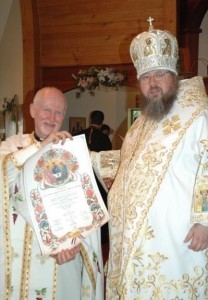It’s the end of another year, and I thought I’d do what so many others are doing, and take a look back at the year that has passed. But I won’t be revisiting all the significant events that took place in 2009; rather, I want to consider the progress of American Orthodox historical studies in the past year.
Early this year, the “myth of unity” was still widely believed. It was pretty common to hear church leaders make the claim that all Orthodox Christians in America were united under the Russian Archdiocese until 1917 or 1921. Now, though, you’d be hard-pressed to find someone saying that. Most everyone seems to generally acknowledge the reality that the Russian Archdiocese did not, in fact, include every American Orthodox Christian. That claim has been replaced by another: that everyone should have been in the Russian Archdiocese — that the Russian Archdiocese was the rightful, canonical authority in America, regardless of whether everyone recognized it at the time.
This shift, from “what was” to “what should have been,” has accompanied a greater reliance on evidence. There seems to have been a general realization that we can no longer simply make bald statements, not based on facts. People still make claims for their favorite jurisdictions, but those claims seem to be more grounded in evidence than they were a year ago. The more we can get away from cherry-picking our facts, or ignoring evidence altogether, the better off we’ll be.
It has been a year of transition in other respects, as well. This year witnessed the retirement of Fr. John Erickson, the longtime church history professor at St. Vladimir’s Seminary, and arguably the leading authority on American Orthodox history. (Although Fr. John has by no means disappeared, and we hope to see even more of his work now that he is no longer in the classroom.) Also in 2009, our own executive director, Fr. Oliver Herbel, was awarded a PhD in Historical Theology from Saint Louis University. I point this out not only because of Fr. Oliver’s position with SOCHA, but also because he is one of only a handful of academics with an expertise in American Orthodox history.
This year, of course, saw the arrival of SOCHA, our website, and my own podcast on Ancient Faith Radio. The summer’s conference at St. Vladimir’s Seminary paid considerable attention to the question of our history in America. The pan-Orthodox mandate of regional Episcopal Assemblies has also led to a heightened interest in our history — it seems that forward-thinking developments often inspire a reevaluation of the past. That reevaluation is made all the more exciting by new discoveries, such as story of Orthodoxy in colonial Virginia.
In many respects, 2009 has been a year of great tumult and change in American Orthodoxy in general. In terms of our historical thinking, I daresay there has never been a year quite like 2009. I cannot possibly convey my amazement at the sheer numbers of people who want to learn about American Orthodox history. When we started this website, we expected a few dozen, or perhaps a hundred people to follow our work. Instead, it has been thousands.
On behalf of everyone here at SOCHA, I’d like to thank all of you for reading and listening and commenting. We’ve got some big plans for 2010, so stay tuned.

Dear fr. John, I’m from st. Philaret institute in Moscow. As far as I know, besides, churchi history your interests lay also in ecclesiological questions. For instance, you have an interesting article in the end of 2009 year, related with litugy of baptism etc. Do you have any e-mail to write to you in details about this topic? Faithfully, Dmitry.